A conversation with Marisa Silva – the Lucky PM, passionate and intrigued by projects. The interview has been conducted by Aneta Catalan Sikorska.
I cannot start with the other questions until I ask about “The Lucky PM”. Is there any story behind it? Because when you talk about the PM world, I can see how much you enjoy it. But maybe “Lucky” doesn’t only mean that you love what you do, maybe you are lucky because you still improve the PM/PMO world.
Thank you, first of all, for such kind words. I do try to share my passion and leave my mark in the community at least! Not really a story but there are three main reasons for my luckiness. First, I think that chance or luck plays such an important role in what happens in our life and projects, even if we prefer to ignore it. Sometimes it’s just a matter of being in the right place at the right time and I think that, although talent is fundamental, we need to acknowledge fortunate accidents too. Second, there’s this saying that goes as “there are no good project managers, only lucky ones: the more you plan, the luckier you get”, which I fully agree with because luck also requires hard work and preparation. Finally, because I’ve been very lucky to grown and learn with amazing colleagues, clients, organizations, and project teams. And, of course, I call myself “The Lucky Project Manager” because “The Lazy Project Manager” was already taken!
An experienced PMO and PPM advisor, trainer, author and speaker… We can add a lot of more here and your career still develops. What were the key attributes which help you to be in your current position?
You may be surprised to know that I have an introvert personality. No, I was not born a speaker or trainer, both requiring confidence, an ability to tell a story and to touch people’s emotions. Looking back to where I started, I think that some of the key attributes that helped me to get to this point were my curiosity, active listening skills, and the fact that I’m purpose-driven and selfaware. People are always rushing to deliver, to be something for someone and that doesn’t give you sufficient time for self-reflection. If you are aware of your strengths and weaknesses, that’s a fantastic starting point to build your path, then time and practice will do the rest. Also, I didn’t leave my career entirely chance – once I realised that project management was what excited me, I planned my career around that idea – “the lucky PM” nickname was born out of career planning.
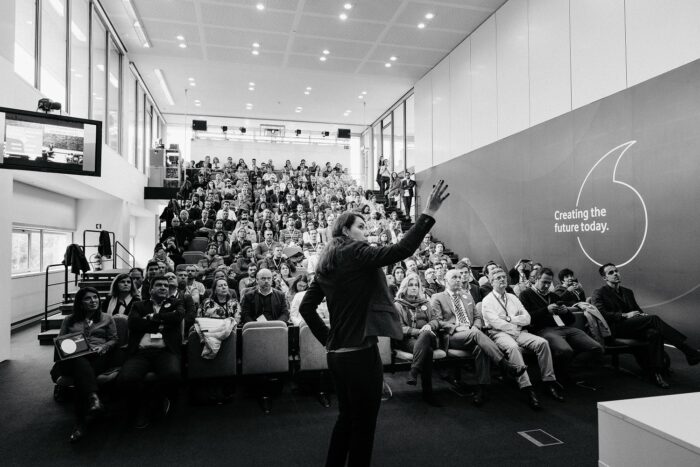 Speaking at the XIII PMI Portugal Conference.
Speaking at the XIII PMI Portugal Conference.
Source: Marisa Silva’s archive
You are also known as a Programs Director at Project Managers Without Borders. What made you decide to join this organization? What was the most important thing/skill you got from this project?
Due to other priorities I had to abandon my position at PMWB some time ago, however it remains one of the volunteering positions that I’m most proud of. Ultimately, projects are about our future and leaving a better world for future generations. PMWB’s view of project management as a competency useful to all and their mission of making the world a better place through projects was a strong motivation to me. If resources – knowledge included – are unequally distributed and if one can simply use their skills for social good, why not do it? It was a privilege to follow my passion and knowing that others would benefit from it. Whether an irrigation program in Panama with local farmers or working with government entities to solve a flooding problem in Ghana, there were so many opportunities to do good. If you have some time available, please do look them up.
Bedtime Stories for Project Managers – what was the trigger to write this book and who can get the most from this lecture?
I have always been fascinated by stories. It’s such an easy and enjoyable way of sharing a message and it brings me sweet memories since my passion for reading started with the stories my parents read to me as a child. As for Bedtime Stories for Project Managers, the idea arose when I was shadowing a trainer colleague who used the story of the stone soup (very well known in Portugal) to make a point about scope creep. I found it such a clever idea that I then started looking for other metaphors that would make the understanding of project management easier. The book brings together fairy tale stories and project management concepts and this helps readers to establish relationships between ideas, to look at a known model from a new fresh perspective, and to consolidate knowledge, thus I believe it can suit anyone, from experienced practitioners to someone who that wants to know a bit more of what project management is about. From the popular “Red Riding Hood” story to the “Bed of Procrustes”, stories provide an opportunity to reflection and imagination – for children as well as for grown-ups.
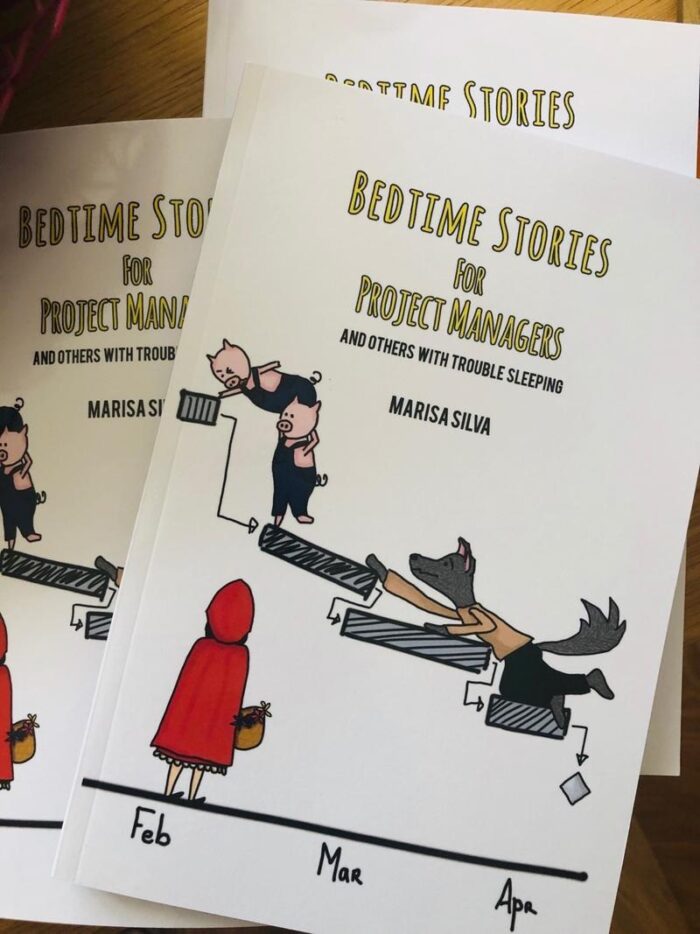 Bedtime Stories for Project Managers, Marisa’s book.
Bedtime Stories for Project Managers, Marisa’s book.
Source: Marisa Silva’s archive
What are the greatest achievements in your career? Something you can be proud of the most?
I’m fortunate to say that there are several achievements that I’m proud of so it is difficult to choose, however, maybe to have been one of the youngest fellow members of the Association for Project Management, the chartered body for the project profession. Additionally, to have co-created a course just for PMO practitioners and leaders and having seen it turning into one of the most popular courses in the area is something that really puts a smile on my face.
You are a very charismatic woman, people want to listen to you, learn from you. What drives you and gives you energy to participate in these all activities? In this busy life it is not difficult to keep work-life balance? Or maybe it is what completes you?
One thing I can say for sure – it does require energy and time and sometimes it feels like I have my paying working hours and my non-paying work time just after! It is indeed a busy life but it would be a bit bothering if different I guess. I remember one evening where I was flying back from Glasgow having completed a full day of training, followed by dinner in Windsor with my colleagues from work, followed by a flight to Yerevan, in Armenia where I was going to speak about PMOs the next day, all non-stop! It can be very tiring but it is also very rewarding. The saying goes that it doesn’t feel like work when you are having fun – that’s exactly the case. Yet, this is not to say that I disregard the work-life balance and now, with 100% remote working due to the pandemic, this matters more than ever, for one’s mental health even. I do respect my ‘Netflix and chill’ time – as with anything balance is needed.
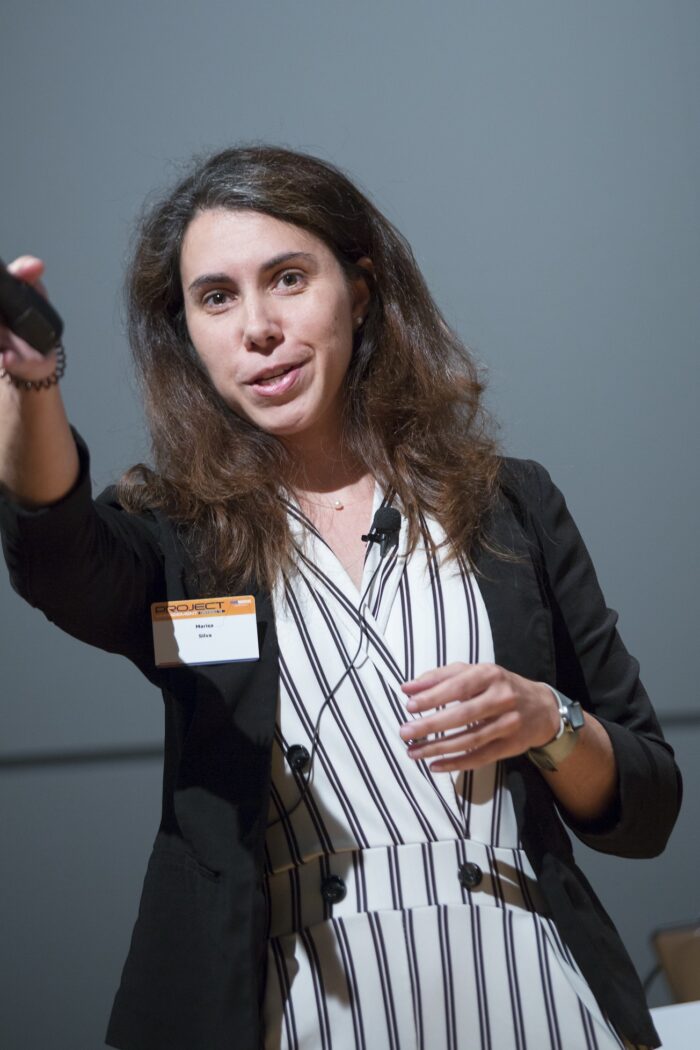 Fot. Sotiris Papadimas Photography Speaking at the Project Conference 2018, Greece.
Fot. Sotiris Papadimas Photography Speaking at the Project Conference 2018, Greece.
Source: Marisa Silva’s archive
When we compare the percentage of women and men in the position of PM, we still see a significant dominance of men. Is project management a man’s world?
I think that is a reality, but we are slowly but steadily changing it. Project management is contextual but it must not be gender-based! Fortunately, I never felt treated differently by being a woman in project management and I can’t find any disadvantages of having more women involved in the field. Quite the opposite, I think that women, being multi-taskers, intuitive, and very proficient at managing expectations, make an ideal project leader and that is being recognized by more organizations every day. The development of societies and the empowerment of women are hand in hand thus, to be working in project management as a woman, is an opportunity to lead that change from the field. We need to be that change we want to see in the world.
What do you think is the positive influence of women on the high position in the corporate ladder?
Women can bring a different, fresh perspective into how decisions are made. After all, we have been leaders our all life however not always in the corporate world so this it the time to take a step up on that ladder. Women tend to show more empathy, to consider more and novel scenarios, and to be very attentive. We bring diversity to the table in an effective, outcome-focused way – just look at how the pandemic was managed by countries ruled by woman.
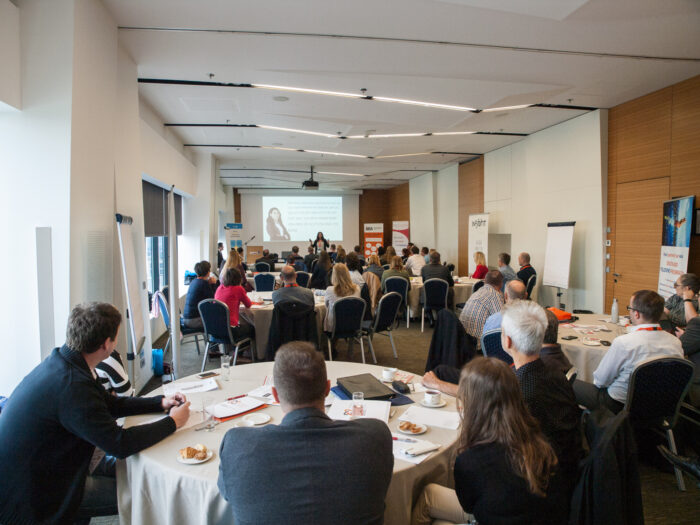 Speaking at Project Management in Practice Conference, Slovenia, 2019.
Speaking at Project Management in Practice Conference, Slovenia, 2019.
Source: Marisa Silva’s archive
You’ve probably already had a lot of questions related to the PM/PMO world and influence of pandemic. But from your perspective, what was the biggest challenge for the organizations during that time?
I think a big one is about keeping the teams connected – not to the screen, but to each other, their togetherness. Aspects like motivation, trust and collaboration gained a new importance now that we are no longer sitting together in the office. We miss that human connection and organizations will need to find new and creative ways to instil a sense of the collective. Also, from a pure PM/PMO standpoint, many businesses had to re-evaluate their portfolios of projects and programmes. Suddenly, their revenue streams were cut, resources were diverted, projects were de-prioritised. Finally, organizations started to realize that they can’t simply afford to pay lip service to effective portfolio management.
In this new reality, should the PMO evolve? Be more flexible, predictable…?
Absolutely. As any other teams, the PMO needs to reinvent itself. How to do effective assurance remotely? How to coach the project teams and facilitate workshops now that everyone is working on their own? These are questions that should be in any PMO’s mind at the moment. We crave flexibility and the PMO should act as a servant leader and enable that flexibility if it wants to be recognized as a valuable business partner.
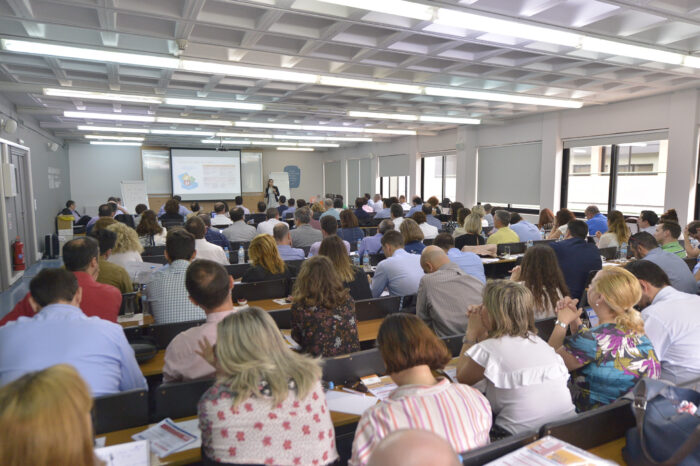 Fot. Sarantioglou Kornilios Facilitating a workshop at Project Conference 2018, Greece.
Fot. Sarantioglou Kornilios Facilitating a workshop at Project Conference 2018, Greece.
Source: Marisa Silva’s archive
Do you predict that any other new structure will replace PMO in the future?
Despite criticism, I believe that “PMO” is a somewhat established concept in the industry, hence should be around for some time. It is the services of the PMO that are most likely to change and I believe that we will see PMOs acquiring strategic relevance and dedicating more of their time to value-added activities such as data analysis and predictive assurance (rather than just data collection and reactive assurance), project selection and prioritization, or capability-building. The PMO brings processes, practices, lessons, people together. We are integrators at heart, silo-breakers – thus, whether we will be calling it PMO or something else, centralized or de-centralized, I believe that this integration remains a fundamental quest of any organization, now or in the future.
I would like to come back to your lecture „From PMO Stakeholders to PMO Customers” from the last Portfolio Experience conference in Poland. You said „Change needs to start from the inside of the organization”. How do these organizations know it is time to start with this change? How should they start this revolution? What is the most important to improve?
Working as a consultant, it’s not uncommon for me to get to an organization just to learn that internal staff was aware of the problems already and had even considered viable solutions, however, that tacit knowledge is often neglected, not valued or sometimes it doesn’t even reach the decision-makers. Have a look at the “iceberg of ignorance” model – it’s so sad that there’s such big of a disconnect between what people in the field know and do and others at the top! Thus, for organizations to know when it is time, they just need to do a simple thing: listen. Listen more, listen better. Once that “a-ha” moment happens, you should co-create the change. Revolutions are sometimes needed but they require plenty of resources. I do prefer evolutions instead, there are less casualties involved. Thus, don’t believe you can do it on your own or overnight. It is a journey and as any successful journey, it should be planned with care, and taking people with you. In my view, the most important element of it, is therefore the people and their mindset. That is what will make change stick and that’s where organizations should focus.
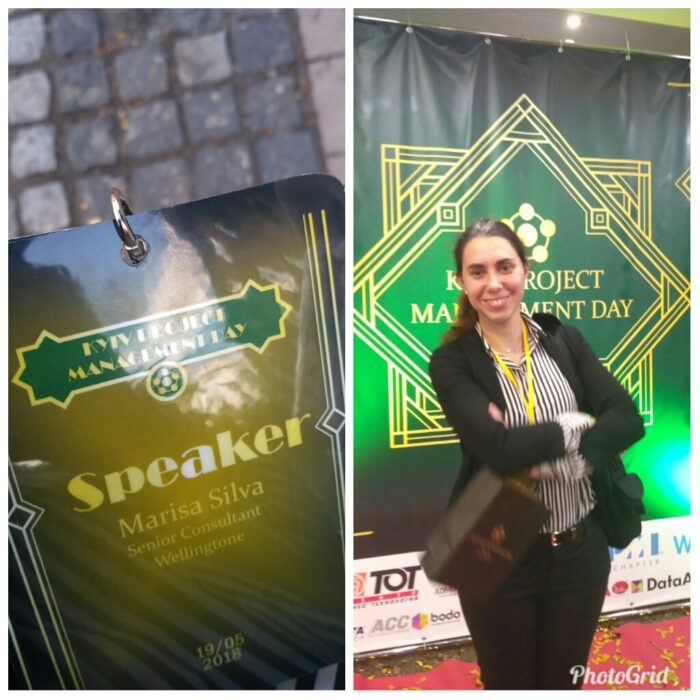 Marisa Silva’s archive
Marisa Silva’s archive
I also want to come back to your question: How can the PMO support the mindset shift for organization transformation? What is the most valuable?
The PMO can be an important bridge between strategy planning and strategy implementation, and therefore being a vehicle of communication between the two ends, translating messages into day-to-day job and passing back insights and feedback to decision-makers. Yet, I would argue that the best way the PMO can support the mindset shift is by walking the talk and leading by example. They should try it themselves, almost acting as a pilot group. Ultimately, PMOs are change agents, thus, they should be leading the change from within.
What is the biggest challenge for current PMOs? Does the small organization face the same problems as a bigger one?
I think that, at the end of the day, organizations struggle with the same challenges and have the same pain points regardless of size or sector – lack of efficiencies, lack of visibility to make informed decisions, lack of resources and predictability. The biggest challenge for PMOs is then to build a catalogue of services that meets the expectations of their customers, the right priority at the right time, and to communicate it effectively. All services will be valuable to someone working in the PMO, of course, however, it should be the customer to define the priorities. Make no mistake: the PMO is a service to be provided, not a department to simply be compliant with. Also, most people still do not know what a PMO does or can do. We need to communicate more and better if we are to be their critical but trusted friend.
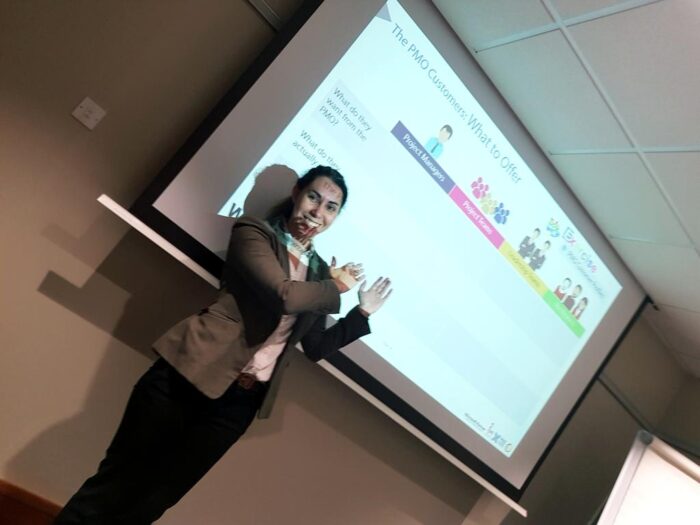 Marisa Silva’s archive
Marisa Silva’s archive
The last question, maybe it will be something that can help young people, who have just started their career: what advice would you give your 25 year old self?
Very good question! “Build your network!”, that would be my advice. Having a reliable and diverse network to support you, challenge you, advise you, learn from, it makes a difference and it certainly made it in my career. I’m not just talking about chasing everyone on LinkedIn but actually getting involved with the community, in an institutional or more informal way, and building real connections. Grow and nurture your network. Then, you just need to “be so good they can’t ignore you” and have a little bit of luck. My dear 25-year-old, may all your projects by lucky!
Marisa is an experienced PMO and PPM advisor, educator, and international speaker, with a track record of building capabilities in organizations undergoing transformational change. A passionate advocate of the value of PMOs
and project management, she was Programs Director at Project Managers Without Borders, Head of External Affairs at IPMA Young Crew Portugal, Secretary of the APM PMO SIG, and is co-author of ground-breaking courses such as the PMO Practitioner, PMO Leader and Assurance Practitioner courses. Marisa is a Senior Consultant at Wellingtone, a founding member of the Advisory Board of the PMO Global Alliance and is the author of Bedtime Stories for Project Managers. In 2019, Marisa became one of the youngest Fellow members of the Association for Project Management (APM), in recognition of her contribution to the profession and in 2020 she was awarded the title of Young Project Manager of the Year.
Absolwentka Politechniki Łódzkiej wydziału EEIA, przez ostatnie 7 lat pracowała, jako Informatyk w branży telekomunikacyjnej. Niepoprawna optymistka, która uwielbia pracę z ludźmi. Ceni pracę zespołową, ponieważ szczerze wierzy w efekt synergii. Dopiero rozpoczyna swoją przygodę z zarządzaniem projektami. Zafascynowana tym tematem i zdeterminowana, by poszerzać wiedzę i zdobywać nowe umiejętności, dzisiaj konsekwentnie buduje swoją ścieżkę kariery, aby w niedalekiej przyszłości sprawdzić się jako Project Manager. Prywatnie miłośniczka literatury fantasy, kultury latynoamerykańskiej i podróży ze swoją rodziną.